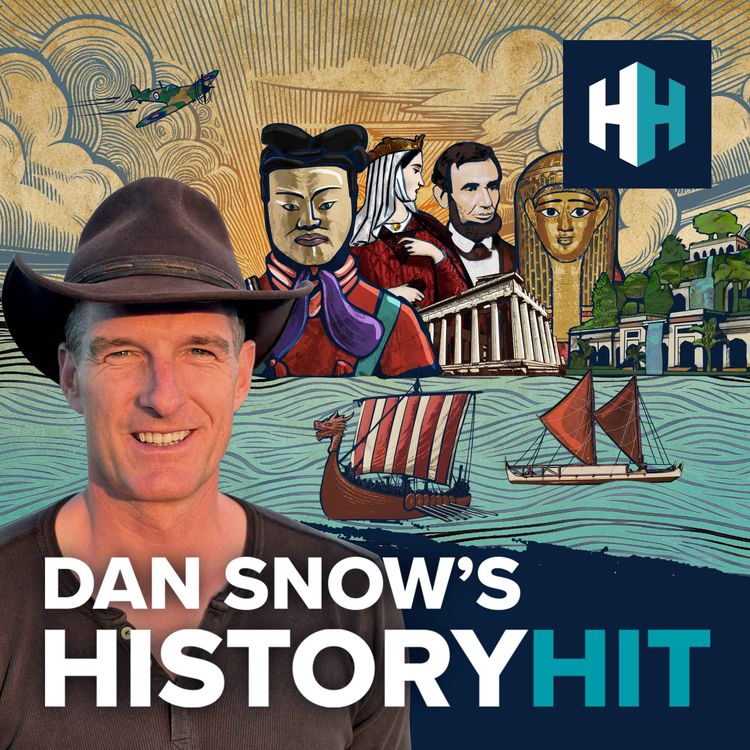Share

Dan Snow's History Hit
Surviving the Great War: Medics in the Trenches
Warning: this episode contains graphic details of injuries.
The brutal nature of the First World War presented frontline medical personnel with an array of horrific and debilitating wounds, inflicted on a previously unimaginable scale. From gas attacks and bayonet wounds to rifle fire and artillery barrages, day-to-day life on the frontlines posed a serious risk to life and limb. The doctors and nurses responsible for medical care rose to the challenge, and the First World War saw a dramatic transformation in the provision of frontline medicine. Many more lives would be saved than lost due to the efforts of these 'lifesavers'. Focusing on the Canadian experience, Tim Cook, author of Lifesavers and Body Snatchers, explains just how important and innovative the work of frontline medical staff was, and reveals the more sinister side of how these advances were achieved.
Produced by James Hickmann and edited by Dougal Patmore.
Sign up to History Hit for hundreds of hours of original documentaries, with a new release every week and ad-free podcasts. Sign up at https://www.historyhit.com/subscribe.
More episodes
View all episodes

1761. The Trial of Charles I
41:46||Ep. 1761More than 350 years ago, something unprecedented happened in Britain: a reigning king was arrested, put on trial, and executed. You may have seen many news outlets refer to this historic event, given the current news agenda regarding Andrew Mountbatten-Windsor. We want to give you the history behind those headlines: what really happened in 1649, and how the English parliament came to pursue capital punishment for a reigning monarch? This episode from our archive dives into the extraordinary chain of events from Charles I's arrest to the moment of his execution. Dan is joined by Dr Rebecca Warren from the University of Kent for a day by day account of the trial and this dramatic case that still echoes through history to the present day. Dan Snow's History Hit is now available on YouTube! Check it out at: https://www.youtube.com/@DSHHPodcastSign up to History Hit for hundreds of hours of original documentaries, with a new release every week and ad-free podcasts. Sign up at https://www.historyhit.com/subscribe.You can also email the podcast directly at ds.hh@historyhit.com.
1760. Royal Siblings, Scandals and Crises
28:11||Ep. 1760The arrest of Andrew Mountbatten-Windsor, formerly Prince Andrew (who denies any wrongdoing and is innocent until proven guilty), has encouraged news outlets to look at the precedent of royals falling foul of the law. Many have referred to the trial and execution of Charles I over 350 years ago as the last British royal to be arrested, but that isn't technically the case...in this bonus episode, Dan gives a potted history of the many times royals - princes in particular - have found themselves in trouble with the law and with their monarch siblings. From the rivalries of the Anglo-Saxon and Norman kings to the scandals of the Plantagenets and the Georgians, this is a tumultuous account of Britain's monarchy through the ages. Written by Dan Snow, produced by Mariana Des Forges and edited by Dougal Patmore.Dan Snow's History Hit is now available on YouTube! Check it out at: https://www.youtube.com/@DSHHPodcastSign up to History Hit for hundreds of hours of original documentaries, with a new release every week and ad-free podcasts. Sign up at https://www.historyhit.com/subscribe.You can also email the podcast directly at ds.hh@historyhit.com.
1759. The Peasants' Revolt
43:26||Ep. 1759In 1381, after plague, famine and war had pushed England to the brink, a final blow sparked an extraordinary uprising. This episode explores the Peasants’ Revolt, not as a chaotic riot, but as a coordinated challenge to royal and religious power in England.To cut through the myths, we're joined by medieval historian Dr Eleanor Janega, co-host of the 'Gone Medieval' podcast. She explains what really happened, why it mattered, and how this rebellion sent shockwaves through medieval England and beyond.Produced by Mariana Des Forges and edited by Dougal Patmore.Dan Snow's History Hit is now available on YouTube! Check it out at: https://www.youtube.com/@DSHHPodcastSign up to History Hit for hundreds of hours of original documentaries, with a new release every week and ad-free podcasts. Sign up at https://www.historyhit.com/subscribe.We'd love to hear your feedback - you can take part in our podcast survey here: https://insights.historyhit.com/history-hit-podcast-always-on.You can also email the podcast directly at ds.hh@historyhit.com.
1758. The First Vikings in Iceland
39:32||Ep. 1758From icy seas to fire-lit longhouses, Dan heads to Iceland to trace the birth of one of the world’s most unique medieval cultures — at the very edge of the known world. He joins experts across the country to discover how those early Vikings survived brutal winters in total isolation, save for their tight-knit communities and (surprisingly) warm turf houses. He explores the remarkable medieval chronicle Book of Settlement (Landnámabók) and the dramatic stories preserved in the Sagas of Icelanders (Íslendingasögur) that tell us who the first settlers were, where they came from, and how they carved out a new society on a raw volcanic island.Produced by Anne-Marie Luff and edited by Dougal PatmoreYou can see Dan's adventures in Iceland in his brand new documentary on History Hit. Sign up to watch the mini-series Icelandic Vikings here: https://www.historyhit.com/subscribe.If you'd like to explore Iceland yourself, head to https://www.visiticeland.com/You can email the podcast directly at ds.hh@historyhit.com.
1757. The Picts
36:33||Ep. 1757Who were the Picts, the warriors who stalked Rome’s northern frontier and refused to be conquered? In this episode, we explore how they resisted empire, expanded their power across northern Britain, and built a kingdom of their own. Finally, we tackle the great mystery - why did the Picts disappear?For this, we're joined by Professor Gordon Noble, Senior Lecturer in Archaeology at the University of Aberdeen.Produced by James Hickmann and edited by Dougal Patmore.We'd love to hear your feedback - you can take part in our podcast survey here: https://insights.historyhit.com/history-hit-podcast-always-on.You can also email the podcast directly at ds.hh@historyhit.com.
1756. The Sex Life of Charles II
30:00||Ep. 1756He had at least 14 known mistresses and a hoard of illegitimate children; Charles II's private life was as politically charged as it was scandalous. He presided over the Restoration court, a world of excess, intrigue, gambling, gossip and a lot of sex. Dan is joined by the host of the Betwixt the Sheets podcast, Dr Kate Lister, to explore the salacious side of Restoration England and examine how power, pleasure, and reputation collided at court.A warning that this episode isn't suitable for children! Produced by Mariana Des Forges and edited by Dougal Patmore.You can learn more about Nell Gwynn from Kate in her TV documentary on the History Hit website: sign up at https://www.historyhit.com/subscribe to watchDan Snow's History Hit is now available on YouTube! Check it out at: https://www.youtube.com/@DSHHPodcastSign up to History Hit for hundreds of hours of original documentaries, with a new release every week and ad-free podcasts. Sign up at https://www.historyhit.com/subscribe.We'd love to hear your feedback - you can take part in our podcast survey here: https://insights.historyhit.com/history-hit-podcast-always-on.You can also email the podcast directly at ds.hh@historyhit.com.
1755. The Great Famine
39:34||Ep. 1755In the late 19th century, Ireland suffered a potato blight that became a mass catastrophe. Today, we explore the conditions that left millions vulnerable, and assess the role of the British government in shaping the crisis.For this, we're joined by Professor Christine Kinealy, founding Director of Ireland's Great Hunger Institute at Quinnipiac University.Produced by James Hickmann and edited by Dougal Patmore.Dan Snow's History Hit is now available on YouTube! Check it out at: https://www.youtube.com/@DSHHPodcastSign up to History Hit for hundreds of hours of original documentaries, with a new release every week and ad-free podcasts. Sign up at https://www.historyhit.com/subscribe.You can also email the podcast directly at ds.hh@historyhit.com.
1754. How Did Three Samurai Warlords Unite Japan?
54:05||Ep. 1754Today, we dive into the chaotic final act of Japan’s Warring States period, and hear about the three warlords who brought it to an end. Oda Nobunaga, the ruthless innovator who shattered the status quo on the battlefield. Toyotomi Hideyoshi, the peasant-born schemer who climbed from the lowest social ranks to the very top of Japan's hierarchy. And Tokugawa Ieyasu, the patient survivor who outlasted them all and built a shogunate that would rule Japan for over 250 years.Joining us for this is Chris Harding, a cultural historian of Japan, India and East-West connections, based at the University of Edinburgh.Produced by James Hickmann and edited by Dougal Patmore.Dan Snow's History Hit is now available on YouTube! Check it out at: https://www.youtube.com/@DSHHPodcastSign up to History Hit for hundreds of hours of original documentaries, with a new release every week and ad-free podcasts. Sign up at https://www.historyhit.com/subscribe.We'd love to hear your feedback - you can take part in our podcast survey here: https://insights.historyhit.com/history-hit-podcast-always-on.You can also email the podcast directly at ds.hh@historyhit.com.
1753. Whaling
52:52||Ep. 1753The history of whaling is complicated. At its height in the 18th and 19th centuries, whaling was a global enterprise built on perilous voyages, long seasons at sea, and a fierce chase for oil and baleen that illuminated streets and homes and lubricated the industrial revolution. In doing so, obsessed nations like Britain, Norway and America hounded whale populations to the brink, decimating populations and altering marine ecosystems forever. But it's important to remember that this industry also has a rich social history. Whaling sustained communities across the globe, providing work, culture and a crucial way of life for working people in coastal regions and on remote islands like Shetland off the coast of Scotland. In this episode, Dan heads to Dundee, once a hub of the whaling industry, to explore both the devastating ecological impact and the rich human story to give us a fuller understanding of the history of whaling. He speaks to the curators at the South Georgia Museum, Jayne Pierce and Helen Balfour, as well as Richard Sabin from the Natural History Museum and also one of Shetland's last remaining whalers, Gibby Fraser. You can explore more at https://whalersmemorybank.sgmuseum.gs/ to read through testimonies from other whalers, see incredible archive images and learn more about whales in the Arctic and Antarctic. Produced by Mariana Des Forges and edited by Dougal PatmoreDan Snow's History Hit is now available on YouTube! Check it out at: https://www.youtube.com/@DSHHPodcastSign up to History Hit for hundreds of hours of original documentaries, with a new release every week and ad-free podcasts. Sign up at https://www.historyhit.com/subscribe.You can also email the podcast directly at ds.hh@historyhit.com.